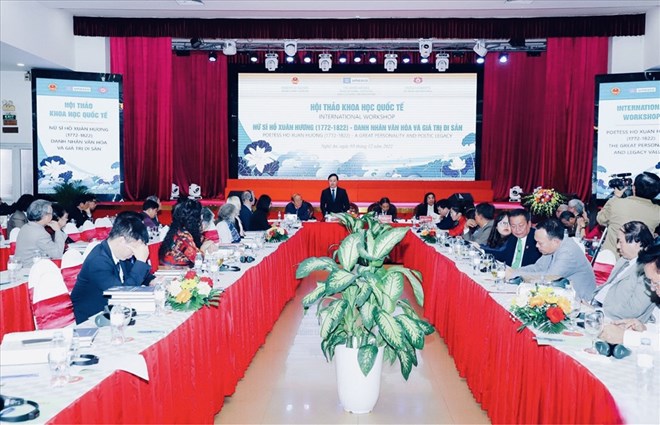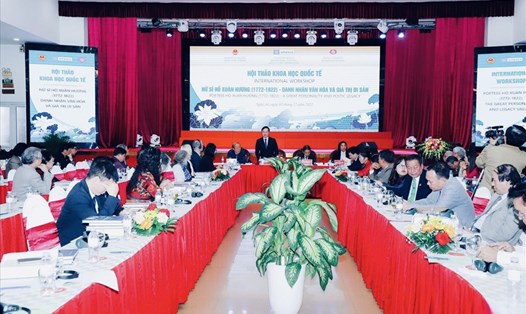Vietnamese female poet honored by UNESCO
On November 23, 2021, in Paris, the 41st UNESCO General Assembly approved the list of "Cultural Celebrities and Historical Events for the 2022–2023 academic year" to honor and commemorate the birth/death anniversaries of recognized historical figures. At this event, the dossier commemorating the 250th anniversary of the birth and 200th anniversary of the death of poetess Ho Xuan Huong was approved along with 58 other dossiers.
This is a special honor for Vietnam. Along with five famous people Nguyen Trai, Ho Chi Minh, Nguyen Du, Chu Van An, Nguyen Dinh Chieu, the name of the female poet from Nghe An is solemnly recorded in the history of national culture.
Resolution 41C/15 of UNESCO has identified 7 core points about the famous person Ho Xuan Huong: Ho Xuan Huong has a profound humanistic ideology with the core being the struggle for the right to live for humans - humans as entities existing on earth with all the needs and aspirations of earthly life; Ho Xuan Huong is a special cultural - aesthetic phenomenon with a unique system of concepts through poetic works. Ho Xuan Huong has made great contributions to feminism, to women's equality; Ho Xuan Huong's legacy is not only poetry, but also a system of behavior - spirit - consciousness for a good progress; Ho Xuan Huong not only fights, protects but also has the awareness to warn, criticize, oppose, and negate what hinders human progress; Ho Xuan Huong and her legacy have a strong vitality, can spread, and inspire many peoples and many countries; Ho Xuan Huong's works have been recognized by researchers in many countries and translated into their own languages.
In search of the origin of the Queen of Nom poetry

According to the application for UNESCO recognition, poetess Ho Xuan Huong (1772 - 1822) was originally from Quynh Doi village, Quynh Luu district, Nghe An province, and was the daughter of scholar Ho Phi Dien. Mr. Ho Phi Dien went to Thang Long to start a career, got married and gave birth to poetess Ho Xuan Huong. The poetess's life was mainly associated with the capital city of Thang Long.
Although her love life was bumpy, her fate was miserable and she died early at the age of 50, she left behind valuable poetic legacies, most notably dozens of Nom poems that have been passed down, the poetry collection Luu Huong Ky, and many anecdotes about her friendship with famous scholars of the time such as Nguyen Du, Pham Dinh Ho, Pham Thai, etc.
However, in the process of researching Ho Xuan Huong for many decades, famous scholars of the feudal period as well as the period from around 1990 and before have not found reliable documents recording basic information about the female writer such as hometown, year of birth, year of death, background, conduct...
Meanwhile, the literary and artistic figures of the same period such as Nguyen Du, Doan Thi Diem, Nguyen Gia Thieu... all have full information and written documents fully recorded.
Information such as Ho Xuan Huong being the daughter of Ho Phi Dien and originally from Quynh Doi village are not found in official documents. Anecdotes about Ho Xuan Huong are passed down in a distorted manner and there are many different opinions. The story of Ho Xuan Huong visiting Quynh Doi village in Nghe An and then going to the village well to fetch water is more a matter of imagination than truth.
Even the poetic legacy considered to be that of Ho Xuan Huong is still very controversial. The most valuable part of Ho Xuan Huong's work is considered to be about a few dozen Nom poems that have been passed down through the generations, meaning they were not officially published, and were later collected and published by some researchers. Researchers still hypothesize about the "Ho Xuan Huong phenomenon", claiming that there are many Nom poems that have been passed down through the generations, composed by other Confucian scholars, but the authors' names are not recorded, and later recorded as Ho Xuan Huong's poems.
Many scholars still debate whether Ho Xuan Huong is the author of the poetry collection Luu Huong Ky or not, when there is a clear difference in style between this poetry collection and Ho Xuan Huong's traditional Nom poems.
Nom poetry in Luu Huong Ky has many solemn Sino-Vietnamese words, the poetic tone is gentle and elegant, not angular, sinewy and somewhat bold, with strong sexual colors like in Ho Xuan Huong's Nom poems that are passed down.
From the above content, there have been many opinions wondering whether or not the character Ho Xuan Huong exists in history.
Ho Xuan Huong in the cultural flow

Historically, there are still doubts, but it cannot be denied that Ho Xuan Huong has become a unique phenomenon in the history of Vietnamese culture. Regarding her origin, the fact that the poetess was originally from Nghe An is not accidental. Nghe An has long been famous for its tradition of mandarin examinations and literature, with many famous names in the history of national culture. The Ho family in Quynh Doi is also a famous mandarin family in the whole country.
In particular, the people of Nghe An are famous for their tradition of diligence, thrift, extraordinary willpower to overcome difficulties, and especially their "stubborn" and stubborn personality, with many unconventional phenomena. Ho Xuan Huong must have been born in a countryside with such characteristic personality traits, to create unique features in artistic thought, bringing new, edgy values and leaving a deep impression.
Poems like:
“Damn the fate of sharing a husband” “If I could change my fate to be a man – Then there would be so much heroism” “If it is fate, then let it be together – Don’t be as green as leaves, as pale as lime”...
Expressing breakthrough thinking, the desire to overcome barriers and constraints to affirm one's own value.
Ho Xuan Huong's poetic heritage has unique values and is suggestive for the contemporary period, especially the young generation.
It is the desire to affirm one's own character and values, the burning desire for worldly happiness, the desire to affirm one's personal ego, to go beyond the heavy notions and prejudices of society.
(Posted in the Special Publication of Labor North Central Spring At Ty)






